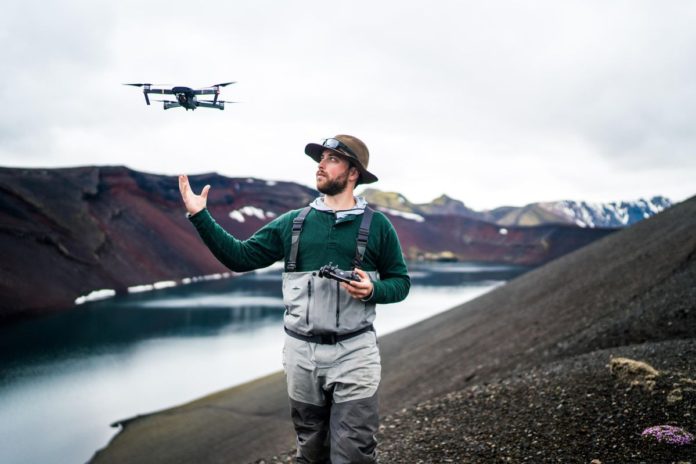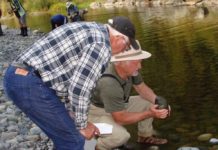In its nine years of existence, the digital media company, Flylords, has become one of the most influential outlets for stories, photos, videos and other content in the world of fly fishing, reaching over 2 million unique anglers per month. The company, founded by Jared Zissu, began as a simple Instagram page, but has morphed into a full-fledged business, with four full-time employees, more than 20 freelance writers, photographers and videographers, and working relationships with some of the biggest companies in the space, including Yeti, Simms and Costa. Flylords is headquartered in Glenwood Springs, Colorado, on the banks of the Roaring Fork River.
We caught up with Zissu, 28, to talk about how Flylords started and grew, how the business model works and how the company has engaged with the explosive growth in the industry during the COVID-19 pandemic.
Forbes: When did you start fly fishing?
Jared Zissu: I first picked up a fly rod in 2012 during my freshman year at Sewanee. I had joined the fire department in town and some of the guys there were fishing guides in Alaska during the summer. They took me under their wing and started taking me to the Elk River in Tennessee, a really cool tailwater, and I got really into it.
Zissu on a shoot in Iceland.
Jared Zissu
Forbes: How does Flylords come into being?
Zissu: I was posting fish pictures on my own Instagram page that freshman year from my dorm room and annoying my friends, so I started a new channel. It started with me pretty much posting my pictures, but then I started curating stories, photos and videos from around the world of fly fishing, and we were pretty much the first people on the platform to do something like that.
Forbes: How does Flylords morph into something bigger than just an Instagram page?
Zissu: The big change was realizing that if I wanted to grow, it was less about curating content and more about creating content. That we needed a website, and that we needed to start publishing our own stories, photos and videos. That put us on a different trajectory.
Forbes: How does that change happen?
Zissu: I worked retail at the Orvis store on 5th Avenue in Manhattan my junior year in college, and then as a marketing intern the year after that at their headquarters in Manchester Vermont. I had taken some film classes in college. But, essentially, this was a ‘fake-it-‘til-you-make-it’ kind of thing, and I learned in the job along the way. After graduating from college, I leveraged the Flylords audience on Instagram to go to lodges in the Seychelles and Bolivia. I took the last $500 in my bank account to buy plane tickets to these places. The idea was that I would give them exposure. On the Seychelles trip, I happened to be at the lodge with a photographer named Joshua Hutchins. He is a Patagonia ambassador and a great photographer and, like those firefighters in college, he took me under his wing and really showed me how to take great shots. A little while later, I went on the Fly Fishing Film Tour for three months, driving the Costa van for 30,000 miles. I experienced all these niche-y fly fishing places, and I got to see how people reacted to these films, when they laughed and when they cried. When I got home, I moved in with my parents and decided to give this a shot as a real business
Forbes: And that’s when you started working on deals with fly fishing companies?
Zissu: Yes. I landed a deal with Scientific Anglers for $500 a month to do some posts and stories about their products. That one deal led to two deals, which led to three deals and so on.
Forbes: So you have all of these followers on Instagram—242,000 at last count, more than Orvis’s fly fishing page—which makes Flylords perhaps the biggest independent voice on the platform. You can leverage them for trips and for deals like Scientific Anglers. That’s one step in the business. What happens next?
Zissu: The business model continued to evolve. My sister had worked for many media companies, including Forbes and Apartment Therapy. I have to give her credit. She kept telling me to look at Flylords as a media company and not as an influencer. That meant we started producing content for Patagonia, Yeti and Buff. It meant that when, say, Simms was launching a new wader line, we could build out a full deck, pitching them on how we would tell their brand story, shoot photos, write articles and do posts on Instagram and Facebook. We started looking at everything from a media brand perspective.

Flylords photo that appeared in Yeti’s book, “Tarpon.”
Jared Zissu
Forbes: You are curating content, doing marketing deals with companies, producing your own content. What are the other parts of the Flylords business?
Zissu: We do merchandise. We have a license with the Grateful Dead, which has worked out great. And we’ve begun to help brands with their own internal digital brand strategies, taking the skills sets that we’ve built and applying it to their brands. We’re doing this with Abel and Ross reels now, running their digital marketing, along with a few other brands.
Forbes: Because of the pandemic, 2020 was a year of explosive growth in the sport of fly fishing. What did Flylords do in response to that?
Zissu: It was a crazy year. Our audience nearly doubled. It’s been super cool to see the influx of new anglers. We’ve been trying to arm these new anglers with two tools. The first is about etiquette—how to handle a fish, how to handle yourself on the water. It’s basically etiquette 101 articles on how to get into this tight little niche community of fly fishing, and treat people and places with respect. The other part is conservation. We have some really talented writers, many with backgrounds in law, who love fly fishing and conservation and have their fingers on the pulse of what’s going on in conservation, with Trout Unlimited, the Everglades and with Pebble Mine. Every week we try to highlight something people can take action on, like letters to politicians, donations or something they can do personally on the water.
Forbes: What’s next for Flylords?
Zissu: I look up to a few media companies in the outdoors space, like Meateater, The Inertia and Teton Gravity Research, and admire what they’ve been able to do when it comes to expansion and buying brands. I wonder if we could do the same thing in the fly fishing space. I don’t have a whiteboard with a five or ten year plan for Flylords. Things change very rapidly in this space. We want to continue to expand with the fly fishing community and keep telling inspiring stories, and be a place for the hardcore fly angler as well as a place for someone who just does it once or twice a year. Our overall goal is to try to convey emotion, and we want to keep doing that.
Credit: Source link































